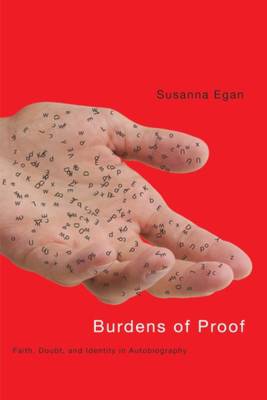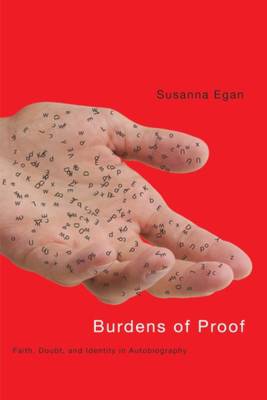
- Afhalen na 1 uur in een winkel met voorraad
- Gratis thuislevering in België vanaf € 30
- Ruim aanbod met 7 miljoen producten
- Afhalen na 1 uur in een winkel met voorraad
- Gratis thuislevering in België vanaf € 30
- Ruim aanbod met 7 miljoen producten
Omschrijving
Autobiographical impostures, once they come to light, appear to us as outrageous, scandalous. They confuse lived and textual identity (the person in the world and the character in the text) and call into question what we believe, what we doubt, and how we receive information. In the process, they tell us a lot about cultural norms and anxieties. Burdens of Proof: Faith, Doubt, and Identity in Autobiography examines a broad range of impostures in the United States, Canada, and Europe, and asks about each one: Why this particular imposture? Why here and now?
Susanna Egan's historical survey of texts from early Christendom to the nineteenth century provides an understanding of the author in relation to the text and shows how plagiarism and other false claims have not always been regarded as the frauds we consider them today. She then explores the role of the media in the creation of much contemporary imposture, examining in particular the cases of Jumana Hanna, Norma Khouri, and James Frey. The book also addresses ethnic imposture, deliberate fictions, plagiarism, and ghostwriting, all of which raise moral, legal, historical, and cultural issues. Egan concludes the volume with an examination of how historiography and law failed to support the identities of European Jews during World War II, creating sufficient instability in Jewish identity and doubt about Jewish wartime experience that the impostor could step in. This textual erasure of the Jews of Europe and the refashioning of their experiences in fraudulent texts are examples of imposture as an outcrop of extreme identity crisis.
The first to examine these issues in North America and Europe, Burdens of Proof will be of interest to scholars of life writing and cultural studies.
Specificaties
Betrokkenen
- Auteur(s):
- Uitgeverij:
Inhoud
- Aantal bladzijden:
- 210
- Taal:
- Engels
- Reeks:
Eigenschappen
- Productcode (EAN):
- 9781554583331
- Verschijningsdatum:
- 20/04/2011
- Uitvoering:
- Paperback
- Formaat:
- Trade paperback (VS)
- Afmetingen:
- 152 mm x 226 mm
- Gewicht:
- 294 g

Alleen bij Standaard Boekhandel
Beoordelingen
We publiceren alleen reviews die voldoen aan de voorwaarden voor reviews. Bekijk onze voorwaarden voor reviews.











